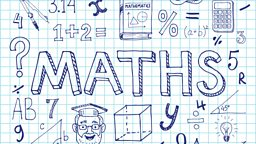Maths

Mathematics is a creative and highly interconnected discipline that has been developed over centuries, providing the solution to some of history’s most intriguing problems. It is essential to everyday life, critical to science, technology and engineering, and necessary for financial literacy and most forms of employment. A high-quality mathematics education therefore provides a foundation for understanding the world, the ability to reason mathematically, an appreciation of the beauty and power of mathematics, and a sense of enjoyment and curiosity about the subject.
At St Joseph's we follow a 'mastery' approach to Maths where we believe that all children can achieve success. We do this by building on prior learning, followed by carefully thought out small sequential steps that allows for deep thinking, reasoning and consolidation of concepts. We believe this subsequently leads to more secure progress.
Intent
It is our intent to deliver a Mastery Maths curriculum that is inclusive and enables all children to participate fully with peers.
We promote the importance of Maths across our school. As the National Curriculum states, Maths ‘ is a creative and highly interconnected discipline…..; that it is essential to everyday life, critical to science, technology and engineering, and necessary for financial literacy and most forms of employment.’
We aim to encourage children to apply their Maths skills as often as they can in other curriculum areas and at home so they can appreciate its usefulness and purpose.
We develop confident, independent and inquisitive mathematicians.
We provide an enjoyable but challenging curriculum that enables all children to leave our school with a secure foundation of knowledge and understanding of the Maths Curriculum which can then be applied with fluency and proficiency in future learning and everyday life.
We put a great emphasis on securing key concepts by teaching depth rather than breadth.
Fluency is the key priority. At age expected levels, we strive for all our children to be able to:
- Recall key number facts e.g. number bonds and times tables with speed and accuracy and use them to calculate and work out unknown facts.
- Use mathematical concepts, facts and procedures appropriately, flexibly and fluently
- Have a sufficient depth of knowledge and understanding to reason and explain mathematical concepts and procedures and use them to solve a variety of problems.
Implementation
Mastery is a continuum. We believe mastery will be achieved when sufficient time is spent on key concepts that are revisited and reviewed. This allows for the development of depth and sufficient practice to embed learning. There are 5 key areas:
1. Coherence
Lessons are broken down into small connected steps that gradually unfold the concept, providing access for all children and leading to a generalisation of the concept and the ability to apply the concept to a range of contexts.
- Representation and Structure
Representations, including images and concrete materials, used in lessons expose the mathematical structure being taught, the aim being that students can later do the maths without recourse to the representation.
- Mathematical Thinking
If taught ideas are to be understood deeply, they must not merely be passively received but must be worked on by the student: thought about, reasoned with and discussed with others.
- Variation
Variation is twofold. It is firstly about how the teacher represents the concept being taught, often in more than one way, to draw attention to critical aspects, and to develop deep and holistic understanding. It is also about the sequencing of the episodes, activities and exercises used within a lesson and follow up practice, paying attention to what is kept the same and what changes, to connect the mathematics and draw attention to mathematical relationships and structure.
- Fluency
Is the ability for all pupils to develop quick and efficient recall of facts and procedures and the flexibility to move between different contexts and representations of mathematics.
From the National Centre for Excellence in Teaching Mathematics (NCETM)
Fluency is developed by practising skills to automaticity. Fluency Practice could include counting (including songs), number formation, ordering, recall of facts including times tables, practising calculations and procedures such as column addition and applying concepts such as finding equivalent fractions.
- Number sense – especially important with early learners as it helps pupils maintain their understanding of how numbers work together and make sense of each other and will cement their base understanding
- Frequency – have consistent, frequent mathematics lessons that reinforce the learning of particular subjects or skills. Pupils can seem like they’ve got a good grasp of a subject after a single lesson, but chances are they’ll forget it by the next
- Variety – it is essential that motivation is key to learning and by providing a variety of ways to look at or solve problems that pupils have seen before, keeps engagement high
- Engagement – fun lessons keep students’ focus on what’s in front of them. The more engaged they are with their learning, the more they’ll be able to memorise and apply later on
- Autonomy – allowing students to work on fluency and practice at their own pace and in their own time can foster independent math thinking
-
Fluency aims to commit key knowledge to long term memory. Working memory can then be devoted to deeper understanding and acquisition of new concepts in the main Maths lesson.
Many young pupils need and benefit from systematic provision of sequenced core content that becomes the building blocks of later success. For example, ‘more than 100 basic addition facts must become automatic before children can play around with and contemplate [different] types of problems’ At-risk pupils who are systematically taught the component parts of declarative knowledge not only benefit, but have the potential to take on different trajectories of learning. They are often then able to match or even exceed the attainment of their more advantaged peers. (OFSTED Curriculum Review May 2021)
Every children should have some form of fluency practice every day in one form or another for a total of approximately 15 -20 minutes. It may be spread over a couple of sessions. It can be separate from the main Maths lesson. This can be differentiated according to the level and needs of the child.
Early Years and Year 1/2 will use Little Big Maths and Big Maths as a core resource to support fluency and number bond acquisition and this can be supplemented by Numblocks and other suitable materials such as White Rose and NCTEM resources where appropriate.
Impact
Early Years children should have a focused Maths session every day for at least 15 minutes where early counting and number recognition including subitising occur. This will increase during the year. Little Big Maths is used as a basis for teaching and learning.
Engaging and interactive provision in the Early Years environment along with the supporting adults will play vital roles in helping to embed the learning throughout the day and develop fluency.
In Year 1, a stimulating interactive self-chosen provision should continue to be available.
In Year 1 and beyond, in addition to the daily fluency sessions, there will be the main Maths lesson.
The main daily Maths lessons will last around 45 minutes. It can be separate from the fluency session to allow older children to focus for the whole session on new learning, deep thinking and reasoning and the application of new concepts.
The national curriculum for mathematics aims to ensure that all pupils:
- become fluent in the fundamentals of mathematics, including through varied and frequent practice with increasingly complex problems over time, so that pupils develop conceptual understanding and the ability to recall and apply knowledge rapidly and accurately
- reason mathematically by following a line of enquiry, conjecturing relationships and generalisations, and developing an argument, justification or proof using mathematical language
- can solve problems by applying their mathematics to a variety of routine and non-routine problems with increasing sophistication, including breaking down problems into a series of simpler steps and persevering in seeking solutions.
- www.gov.uk/national-curriculum-in-england-mathematics-programmes-of-study
- www.gov.uk/ofsted-publishes-research-review-on-mathematics-education


